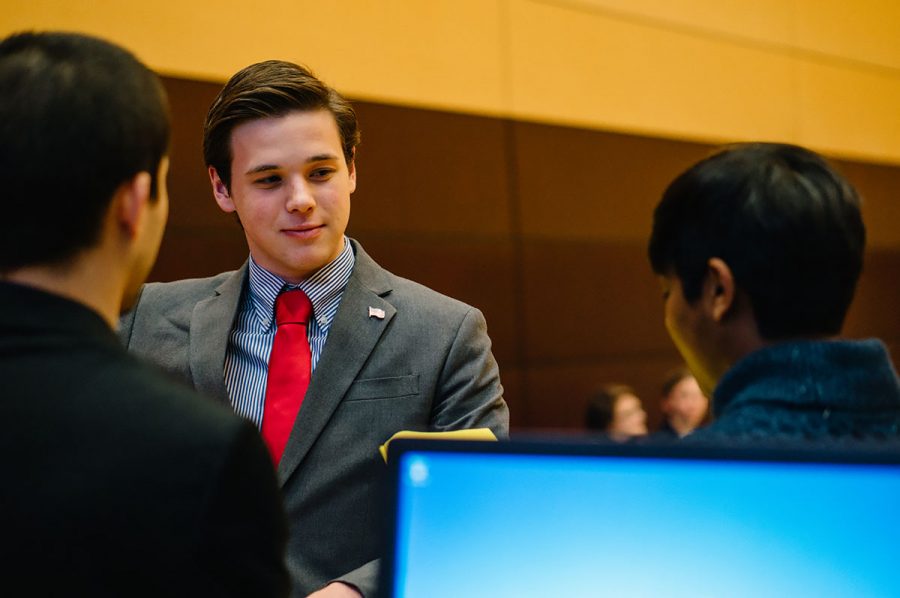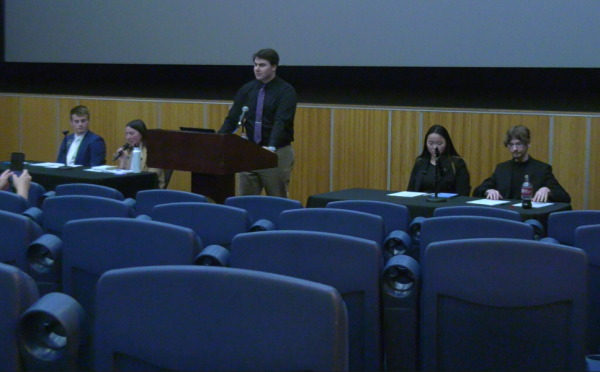Student Senate to vote on Organized Activity Budget
Senate discussed the allocation of funds to campus organizations and activities for the upcoming academic year
More stories from Sam Farley
Photo by Amanda Thao
New senator Peter Currie was appointed at this week’s meeting, in which they discussed the upcoming year’s budget.
Student Senate added a bill pertaining to the 2017-2018 budget for campus organizations to the agenda during their meeting, held at 6 p.m. on Feb. 27 in the Ojibwe Ballroom.
Introduced by Finance Director Jorge Herrero Berengue, the bill lists the tentative allocations of funds for organized activity on campus for the upcoming academic year.
The major impact for students is the bill’s proposal to decrease the segregated fee, which would go down by $129 from the current year.
This reduction translates into the lowering of tuition costs for each student by $2 but would also result in a budget deficit of $4,634.
Berengue said this is a price the operations accounts can afford to pay.
“We thought it would be nice to relieve the students of those two extra dollars if it meant that we would lose $4,634 because we have, what we believe, more than sufficient funds in our operations accounts to take care of that stress,” Berengue said.
In total, the bill estimates the segregated fee revenue to be $1,196,284 for the 2017-2018 school year.
Other major alterations to the budget from this year to next include a 46.7 percent decrease in funds to the Student Senate Readership Program, which provides students free access to various newspapers on campus including the Leader Telegram and The New York Times.
Senator Bobbi Freagon asked about the purpose of this significant change in allocated funds — which would be changed from $15,000 to $8,000.
Students have not been utilizing the papers as much as expected, so the Readership Program will offer fewer newspapers next year but will increase its online accessibility to students, Berengue said.
The budget also stipulates 50, 18.8 and 16.7 percent increases in funds to the Pow-Wow, an annual Native American celebration on campus, the theatre department and the Women’s & LGBTQ Resource Center, respectively.
Programs whose funds would be reduced include Special Reserve (100 percent), None of the Above (13.2 percent), Visual Arts (12.1 percent), Music (4.1 percent), and the Student Senate: General Operations (2.7 percent).
According to the bill document, the 2017-2018 Organized Activity Budget will decrease fees for students while saving the university money.
The total allocation of funds will be an estimated $188,060 less than the previous school year.
The bill will be voted on during the next meeting, which will begin at 6 p.m. on Monday, March 6.
In addition, a resolution pertaining to the segregated fee budget was discussed during the meeting, which passed with a unanimous, vocalized vote.
The resolution showcased Senate’s support for the decreased segregated fees, which are projected to decrease by 1.5 percent. It also highlighted similar funding information found in the aforementioned bill to various UW-Eau Claire organizations.
Chief of Staff Katy McGarry said she is excited to see the changes that are happening around campus as a result of reallocated funds.
“As a member of the finance commission, I voted in support of this non-allocable budget,” McGarry said. “I know that our student dollars are being spent well with these programs.”
The meeting included the addition of one new senator to Senate as well as the nominations of two senators for the elections committee.











